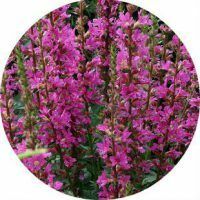
Plakun-grass is a perennial herbaceous plant of the Derbennikov family, which has an upright tetrahedral stem, its height reaches 50-150 centimeters. Most often it grows large, but loose courtesans. In folk medicine it is often also called derbennik ivolistny, a recruiter, oak, gorchak, multicolor and beauty of a girl.
- Composition and healing properties
- Types
- Indications
- Usage
- Contraindications
- Pregnancy
Growing derbennik everywhere, but more often you can see it in sunny regions with moistened soils. Plakun-grass is a honey-tree, therefore since July, thanks to bright beautiful flowers, it attracts many butterflies and bees. Collected from its flowers, honey is distinguished by its special aroma, amber color and slightly tart taste. At the end of August, it is already possible to collect the ripened fruits of the plant, which look like oblong round capsules filled with seeds.
For medicinal purposes, fruits, leaves and roots of derbennik are collected. The best time to collect the aboveground part is the time before flowering, but the roots are better to excavate in the fall. Medicinal raw materials must be well dried in a ventilated room. You can store it for a year in a dark and dry place.
Composition and healing properties of
The placoon-grass composition includes:
- Resin.
- Phenylcarboxylic acids.
- Essential oil.
- Vitamin C.
- Tannins.
- Saponins.
- Anthocyanins.
- Flavonoids.
- Alkaloids.
- Polyphenols.
- Glucose.
- Carotene.
- Pectins.
- Organic acids.
Drugs based on plants have the following properties:
- Painkillers.
- Anti-inflammatory.
- Antibacterial.
- Diuretics.
- Sweatshops.
- Toning.
- Haemostatic.
- Astringent.
- Wound healing.
Species
The Derbennikov genus includes at least 30 species that grow in different parts of the world. The most famous ones are the quail and the rod-shaped. The second species differs from the first by the more compact size of the bush, the bright color of flowers and smooth leaves( the leafy plant has leaves on the leaves of the plant).In addition, unlike the ivory, the rod-shaped species of placoon-grass is frost-resistant and does not need to be sheltered during cold weather. Different varieties of each plant species have different shades of pink-crimson color.
Other plant species are also popular:
- Elastomeric.
- Tubular.
Indications
In folk medicine the main indications for the use of plants are:
- Headache.
- Diseases of the upper respiratory tract. Seizures, epilepsy.
- Dysfunction of the digestive system( as an analgesic for pain in the stomach, dysentery, diarrhea, chronic intestinal catarrh).
- Bites of poisonous insects and snakes( counteracts edema of the brain).
- Hemorrhoids.
- Nervous disorders.
- Skin lesions( eczema, dermatitis, wounds, bruises, etc.).
- Varicose veins.
- Pathology of the genitourinary system.
- Diseases of a rheumatic nature.
- Uterine bleeding.
- Insomnia.
Application of
At home from plakun-grasspreparing:
- Tea from flowers: 1 teaspoon of raw material pour a glass of boiling water, insist 30 minutes and drink 100 milliliters 3 times a day for headache, stomach ulcer, gastritis.
- Infusion : 5 grams of dried herb pour 250 milliliters of hot boiled water, cover and insist about 4 hours. Ready infusion take 1/3 cup 3 times a day. Use for bleeding, colds, gastrointestinal problems, rheumatism, epilepsy.
- Spirituous tincture of : 1 tablespoon of dry raw material to pour 100 milliliters of vodka, close tightly and put into a cool cool place for 14 days, sometimes shaking the vessel. Take in a diluted form( 20-30 drops per 50 milliliters of water) 3 times a day for 30 minutes before meals. Tincture is indicated for the treatment of gastric pains, acute respiratory viral infections, nervous disorders.
- Broth is prepared from the roots of the plant: 1 tablespoon of raw material, pour 200 milliliters of boiled warm water, boil for 5 minutes, insist for 1 hour and strain. A ready-to-use remedy for consuming 50 milliliters 3 times a day before meals. Take for insomnia, colds, etc.
For fast and painless tightening of wounds, with bruises, bites, you should apply a slurry prepared from fresh stems of a medicinal plant to a sore spot.
to contents ^Contraindications
Placoon-grass is not a toxic plant, but some contraindications to its use still exist. Do not take Derbennik medicines with:
- Atherosclerosis.
- Inclination to blood clotting and clotting.
- Atonic constipation.
Due to the fact that the plant has the ability to narrow vessels, patients with hypertensive disease should use it to monitor the pressure.
to table of contents ^During pregnancy
Drug use from placoon-grass for pregnant and lactating mothers is recommended only in consultation with the attending physician-gynecologist.
